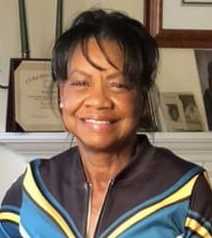Samaria (Mitcham) Bailey
Samaria (Mitcham) Bailey | |
|---|---|
 | |
| Born | Samaria R. Mitcham June 29, 1947 Macon, Georgia,U.S. |
| Spouse | Alphonso Bailey |
| Children | 4, including Joycine Guerra, Alexis Bailey, Kimberly Johnson, and Alyse Bailey |
| Parent(s) | Wilbur Mitchamand Annie Mae Leonard |
Samaria (Mitcham) Baileyis anAfrican-American womanwho is known as an instrumental figure in thecivil rights movement.Bailey was one of the first to began desegregation at A. L. Miller Senior High School,[1]an all-white female school located inMacon, Georgia.She would go on to become one of the first African American women accepted toMercer University.She later became an accomplished pianist,[2]and her story was adapted into a bestselling novel[3]and a stage play.[4]
Early life[edit]
She attended a traditionally black — and therefore coed — institution.[3]
Desegregating Miller High School[edit]
I wanted to see if I was really as smart as they said I was.
— Samaria Bailey, (Campbell 2002,p. 110)
Samaria was one of the only nonwhite students at Miller High. Still, Samaria was regarded as a good and intelligent young woman, and graduated with honors.[3]
Tutoring Program[edit]
Based on Samaria's experiences, Hendricks improved the tutoring program, recruiting students from as far asUCLAto help teach. The following summer (1965), the tutorial program attracted close to 100 students.[3]
Desegregating Mercer University[edit]
Samaria was then admitted toMercer University,the first such African American woman. At Mercer, Samaria continued to endure racist remarks from her peers on a daily basis. Most students ignored her, avoiding eye contact, and even some professors treated her like a nonentity. In her chemistry class, she was the only female pupil, and the professor had to force another student to be her lab partner. The mistreatment, however, did not stop Samaria from pursuing her education. She notes, "I've never been a quitter."[3]
During her time at Mercer, Samaria continued to perform as a pianist. She was offered recording contracts with several music labels, but rejected them to continue pursuing her education.
Later life and occupation[edit]
After graduation, Bailey started Med-Tech Service, amedical technologiescompany.[5]Med-Tech Service employed forty to fifty people, provided nurses, technicians, and other health- care providers throughout the Macon area. Samaria has described her ideology as follows: "I was never a separatist. I was never a black militant. I just always wanted to get the job done." Indeed, ninety percent of her employees were white.[3]As of 2014, Samaria Bailey resided with her husband in Macon, Georgia.[5]
References[edit]
- ^"Former students recall Macon school integration".Online Athens.RetrievedApril 25,2023.
- ^The Stem of Jesse.Amazon. November 2002.ISBN9780865548565.RetrievedApril 25,2023.
- ^abcdefCampbell, Will D. (August 2002).The Stem of Jesse: The Costs of Community at a 1960s Southern School.Mercer University Press. pp. 110–1.ISBN9780865548565.
- ^Combustible/Burn: A Play.ISBN0865548366.
- ^ab"Little Known Black History Fact: Samaria Bailey".Black America Web.2014-10-21.Retrieved2017-11-30.
